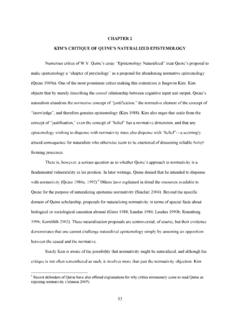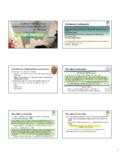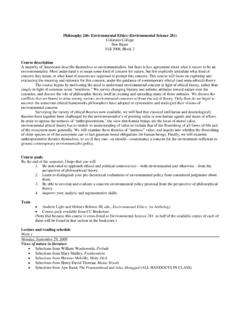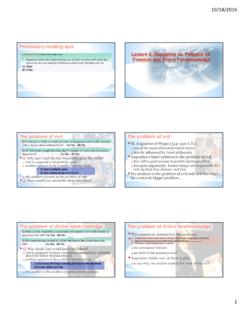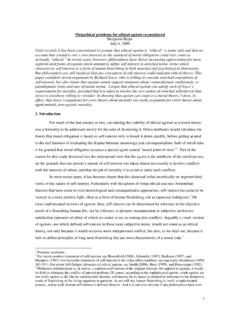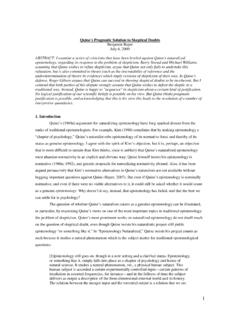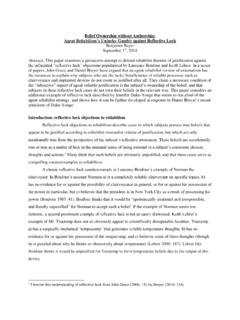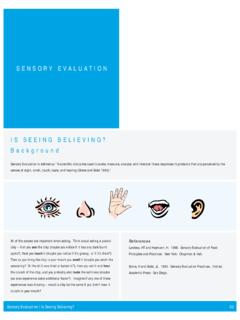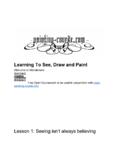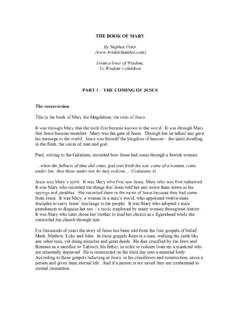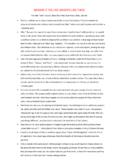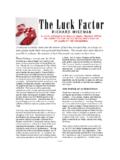Transcription of Believing at Will and the Will to Believe the Truth
1 Believing at will and the will to Believe the Truth August 8, 2013. Benjamin Bayer ABSTRACT: I defend the possibility of a form of doxastic voluntarism, by criticizing an argument advanced recently by Pamela Hieronymi against the possibility of Believing at will . Conceiving of Believing at will as Believing immediately in response to practical reasons, Hieronymi claims that no form of control we exercise over our beliefs measures up to this standard. While there is a form of control Hieronymi thinks we exercise over our beliefs, evaluative control, she claims it does not give us the power to Believe at will because it consists in the consideration of reasons constitutive of Believing that are not, at the same time, practical reasons.
2 I argue that evaluative control does amount to the ability to Believe at will , because there is a practical reason the consideration of which also constitutes some acts of Believing : the value of Believing the Truth . The form of voluntarism I defend is consistent with a robust evidentialism. 1. Introduction There are two distinct strains of recent opposition to the thesis of doxastic voluntarism, the idea that there is an important sense in which we exercise voluntary control over our beliefs. One strain, exemplified by the work of William Alston (1988) and Alvin Plantinga (1993) opposes voluntarism as part of a campaign against what it takes to be the presuppositions of evidentialist, internalistic epistemology.
3 If we do not exercise voluntary control over our beliefs, it suggests, then because ought implies can, there is no sense in which evidentialist oughts govern our belief. We cannot legitimately judge beliefs we cannot help but Believe , and so evidentialist norms facilitating such judgment are inappropriate. Oddly, another strain of opposition to voluntarism comes from the pro-evidentialist camp. Recently Jonathan Adler (2002), Nishi Shah (2006), and Pamela Hieronymi (2006, forthcoming) have offered arguments against voluntarism out of concern that the idea of Believing at will implies the ability to choose a belief regardless of the available evidence, an idea they think lends credence to anti-evidentialism.
4 They argue that no mental state adopted regardless of the available evidence can count as a form of belief, since belief by its nature aims at the Truth . This helps support evidentialism by undermining the very coherence of an anti-evidentialist position that regards as permissible such seemingly impossible mental states. In this paper I wish to examine and critique Hieronymi's arguments in particular. I mention that there are both anti- and pro-evidentialist arguments against voluntarism because I do not want my criticism of Hieronymi to suggest support for the kind of voluntarism that many anti-voluntarists see as aiding anti-evidentialism.
5 In defending the possibility of Believing at will , I am doing so with sincerely evidentialist intentions, with the hope to improve the case for evidentialism. On my view, the control we might exercise over our beliefs can help account for why some beliefs are justified or unjustified by the evidence. Indeed I think such control is presupposed by the concept of justification. But I think there is still wisdom in the view that there are certain forms of belief at will that are conceptually impossible. In particular, I hope that my account of Believing at will helps better delineate between unjustified belief and brazenly anti-evidential non-belief.
6 To make this case, I will begin by presenting Hieronymi's argument against the possibility of Believing at will . Here I will show how her argument depends on an assumption about the available forms of response to practical reasons. In the section that follows, I will argue that if we expand our roster of types of practical reasons to include a recognition of the practical value of the Truth , Hieronymi's assumption can be challenged, and a new 1. argument in favor of the possibility of Believing at will can be defended, one which is also consistent with a robust form of evidentialism.
7 In this paper, at least, I do not wish to defend the idea that all beliefs are formed voluntarily, only that some significant beliefs are or can be. Since Hieronymi claims that such voluntary belief formation is conceptually impossible, and since she is not alone in making this claim, I take it that by questioning her assumption about the available forms of responding to practical reasons, I will have advanced a significant philosophical claim. 2. Hieronymi's critique of Believing at will Much to her credit, Hieronymi (2006, 2009) does not deny that we control our beliefs.
8 Rather, she claims that some control is not voluntary in the sense that ordinary intentional actions are. Ordinarily, healthy subjects can raise their right hand at will , but cannot just Believe that it is raining outside at will . And yet, Hieronymi points out, we often seem to deliberate in order to answer questions, like whether or not it is likely to rain. Insofar as the result of this deliberation is a belief, Believing is still under our control. Hieronymi argues that the sense in which belief is under our control is simply a different sense in which raising one's right hand is.
9 Taking a cue from Jonathan Bennett, she describes the kind of control involved in raising one's right hand as acting at will , which she and Bennett claim requires the ability to act immediately in response to practical reasons. Importantly, and further to her credit, Hieronymi specifies the sense of immediacy involved in actions done at will . She does not reject the possibility of Believing at will or voluntarily for the reason others do, on the grounds that forming a belief is not a basic one-step action like raising one's hand.
10 As Hieronymi points out, we can voluntarily prepare dinner even though it is a multi-step process, and it would not be more voluntary if it could be reduced to a one-step process. To say that something is done at will only if it is done immediately, then, is not a simple matter of the number of steps involved in the action, but the kind of steps. According to Hieronymi, there are two considerations that might be called reasons for Believing p. There are those which bear on the question of whether p, and those which bear on the question of whether the belief that p would be worth having.
